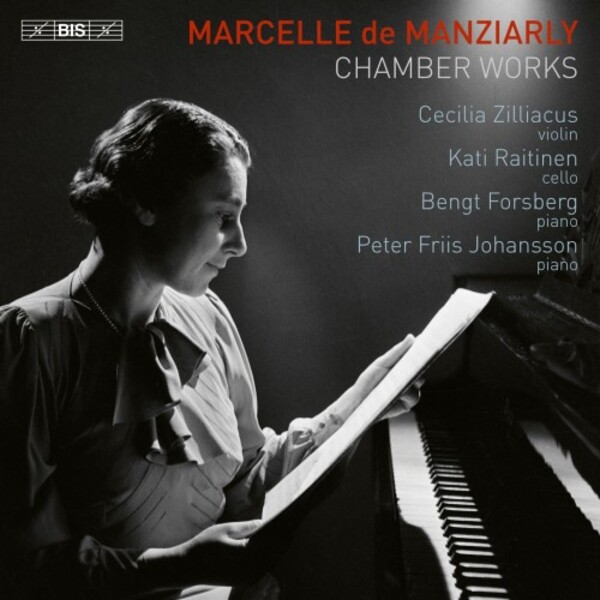MANZIARLY Chamber Works
View record and artist detailsRecord and Artist Details
Genre:
Chamber
Label: BIS
Magazine Review Date: 06/2024
Media Format: Super Audio CD
Media Runtime: 70
Mastering:
DDD
Catalogue Number: BIS2689

Tracks:
| Composition | Artist Credit |
|---|---|
| Piano Trio |
Marcelle de Manziarly, Composer
Bengt Forsberg, Piano Cecilia Zilliacus, Violin Kati Raitinen, Cello |
| Nocturne |
Marcelle de Manziarly, Composer
Bengt Forsberg, Piano Cecilia Zilliacus, Violin |
| Dialogue |
Marcelle de Manziarly, Composer
Kati Raitinen, Cello Peter Friis Johansson, Piano |
| Sonata for Violin and Piano |
Marcelle de Manziarly, Composer
Bengt Forsberg, Piano Cecilia Zilliacus, Violin |
| Trilogue |
Marcelle de Manziarly, Composer
Bengt Forsberg, Piano Cecilia Zilliacus, Violin Kati Raitinen, Cello |
Author: Peter J Rabinowitz
Born in Kharkiv, trained in France and Switzerland, spiritually inspired in India and harboured by the United States, Marcelle de Manziarly (1899-1989) was a peripatetic musician. She was a peripheral one, too. There’s little written about her, so you’re most likely to bump up against her name when you’re reading about someone else – her teacher Nadia Boulanger, her friends Aaron Copland and philosopher Jiddu Krishnamurti. I believe this is the first recording devoted entirely to her music.
It’s a surprising one, too. Her most often-recorded works – a chic setting of three La Fontaine Fables, a bright Scarlatti pastiche and a helium-filled Flute Trio – are from the middle of her career. The music here, from both earlier and later in her life, is tougher, more concentrated and more powerful.
Most gripping is the ostinato-driven Trio from 1921. Bearing the scars of the First World War, it’s a brooding work that tends to gnaw anxiously at short motifs. It oscillates uneasily between the forceful and the intimate; but even when it’s illuminated by flashes of gorgeous lyricism, a spirit of lamentation prevails. The sense of loss is even greater in the 1918 Violin Sonata, especially in the cries of pain that sear the claustrophobic finale, a movement that struggles to a hard-won peace but doesn’t leave you quite satisfied. Neither work has the ‘sparkle’ that Copland admired in the last of the Fables.
Nor do the Dialogue and Trilogue, from the 1970s. Here, Manziarly’s voice shows the influence of Messiaen and Webern – tonality is pushed further into the distance, lines are more jagged, textures are sparer, counterpoint is more striking. Again, there are bursts of soaring beauty (check out the dreamier music in the first movement of the Trilogue) – but the overall mood is similarly grim and the technique is similarly grounded in manipulation of minimal materials. The brief, retrospective Nocturne is less beholden to high-modernist practice but its clotted sweetness still resonates with profound regret.
Cecilia Zilliacus, Kati Raitinen and Bengt Forsberg, who often record together in varying combinations, play with their accustomed unanimity; they’re tonally rich and rhythmically secure, and their balances are exemplary. Peter Friis Johansson matches their excellence: this performance of Dialogue is even more tightly focused than the committed reading by dedicatee Gilberto Munguia and pianist Thomas Hrynkiw (Cambria). As always, BIS’s engineering is solid. A revelatory release.
Discover the world's largest classical music catalogue with Presto Music.

Gramophone Digital Club
- Digital Edition
- Digital Archive
- Reviews Database
- Full website access
From £8.75 / month
Subscribe
Gramophone Full Club
- Print Edition
- Digital Edition
- Digital Archive
- Reviews Database
- Full website access
From £11.00 / month
Subscribe
If you are a library, university or other organisation that would be interested in an institutional subscription to Gramophone please click here for further information.




